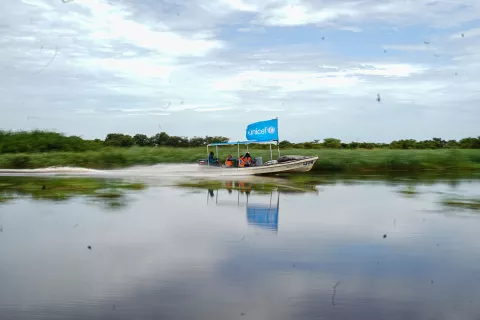Supplying hope for children in Pakistan
A range of UNICEF programme supplies are helping the most vulnerable children in Pakistan survive and thrive.

Not so long ago, 16-year-old Malook was among an estimated 23 million children in Pakistan not attending school. But in 2018, she joined a UNICEF-supported Accelerated Education Programme (AEP) centre in the Bahawalpur district, Punjab.
Since then, Malook walks with a group of girls to attend AEP classes – each one carrying her distinctive blue UNICEF backpack. Backpacks were among the $1 million in education supplies that UNICEF provided to Pakistan in 2021. Malook will soon finish her AEP studies and is closer to realising her hope to become a teacher.
“Education has given me the confidence to fulfil my dreams,” she says.
Children and adolescents attending the AEP have either never had the opportunity to study or had to drop out before completing their primary school years. When they graduate from the AEP, they can be mainstreamed into lower secondary grades in public schools. UNICEF supports 240 AEP centres in Punjab. As a result, some 10,000 children are learning and looking toward a brighter future.
Assistance for the most vulnerable
Last year in Pakistan, an estimated 11 million people – roughly 5 per cent of the population – needed humanitarian assistance. UNICEF Pakistan programmes, focusing on the needs of the most vulnerable children and families, included the delivery of vaccines, cold chain equipment, therapeutic food, and education material. $469 million in supplies to Pakistan represented 10 per cent of the UNICEF supplies delivered globally in 2021.
Addressing health and nutrition needs
UNICEF delivered 30,000 cartons of ready-to-use therapeutic food (RUTF), worth $6 million, to treat severe acute malnutrition (SAM) in children under 5 years old. In 2021, some 70,000 children diagnosed with SAM were given RUTF at UNICEF-supported health facilities. Nearly 600,000 children received multi-micronutrient supplements to fortify foods and protect against anaemia and vitamin and mineral deficiencies. Over 287,000 trained front-line workers provided 32 million children under 5 years old with vitamin A supplements in a door-to-door campaign. Pakistan is one of two countries where the wild poliovirus continues to circulate. UNICEF delivered over $400 million in polio and other childhood vaccines and biological supplies. A UNICEF-supported national polio campaign reached 40 million children.
Pandemic response
UNICEF delivered over $30.7 million in health supplies to Pakistan. $22.3 million in cold chain equipment will support current and future vaccination campaigns. As part of the COVAX Facility, UNICEF was involved in delivering more than 100 million COVID-19 vaccine doses. To support this, 141 ultra-cold chain freezers were also procured, with the first 41 installed with the required generator sets and air conditioning in 2021. By the end of 2021, 63 per cent of the eligible population had received at least one dose of the COVID-19 vaccine and more than 45 per cent were fully vaccinated.
UNICEF delivered 1,300 oxygen concentrators to health facilities to treat patients with severe COVID-19. Oxygen equipment was also used to treat newborns and children with severe pneumonia.
To support the continuity of Pakistan’s essential health services, UNICEF provided personal protective equipment (PPE) for over 25,000 health-care workers. COVID-19-related PPE supplies included 2.4 million surgical masks to protect health workers during the vaccine rollout.
This article was originally published in the Supply Annual Report 2021




